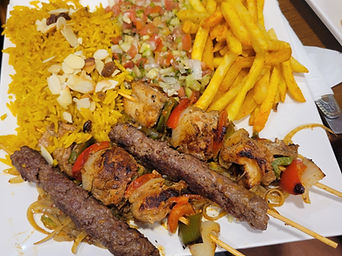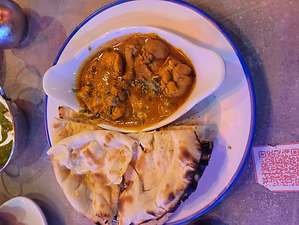University of Florida
Food and Interviews

Lamb Kabab's in Tangier
This struck me as surprising: that in America, I am much more likely to have small talk with a stranger, but much less likely to get to know them beyond those simple conversations in a restaurant. Contrast that with Morocco, where I felt it harder to strike up a conversation, but I could ask more meaningful questions. I suspect the reason lies in the fact that Americans tend to act politely in public, but don’t always genuinely care that much. Compare this to Moroccans, who will only show interest when it is more genuine, and they do want to know about you rather than if you’ll respond to the question of “Is the food good?” Overall, I felt that I better understood the differences between Moroccan culture and American culture through these two interactions that I wouldn’t have had unless I had visited the restaurants.
Everybody requires food to survive, which often leads to restaurants as places to gather, relax, and connect with the culture. At two restaurants, Soraya Food and Bombay Marrakesh, I had two fantastic interactions with a store owner and a local, respectively. At Soraya, our entire study group sat down and ate an amazing meal. When we finished, we got to talk to the store owner and learned how she loves Morocco. Through her, we learned how all the cooks enjoy cooking their dishes, and how the owner had different opinions on the three cities. She said Tangier is a city she could settle down in because the people were friendly and the views were amazing. Chefchaouen, she loved to visit annually for the views and the cats, citing how she loved the clash of blue against the mountain. She then told us that Marrakesh was a great city to “visit for a weekend”, striking us as odd at the moment, but we understood after we visited.

Chicken and Cheese nan from Soraya's Food

Chefchaouen beef couscous
Later in Marrakesh, our group ate at a restaurant, with a couple nearby. After talking to them for a bit, we discovered she was an American who moved to Marrakech for her boyfriend, who owned a small hotel and enjoyed Morocco for the two years she had been there. Through this interaction, we learned just how big the tourism sector affects even the locals to bring in business, and learned how this American decided to move to Morocco to be in a relationship.
Through both these interactions, I came to see Morocco through the eyes of a local better. Rather than thinking of what the city provides me to experience and how I could fill two weeks, each of these experiences reminds me that I should also think about how people choose these cities to live in. I saw them for the advantages of better resources for school and cheaper housing to rent, versus just what advantages they provide me. I also realized through both these that local Moroccans eat out much less often than their American counterparts, because they usually make enough to survive but have much less expendable income to eat where they want. Furthermore, learning from the American and her boyfriend how much they enjoyed living in the city felt smoother with the deeper conversation than in America, where the daily small talk means you never really learn much about people unless you make a dedicated effort to.

Royal Tagine at Star Food by our Hotel